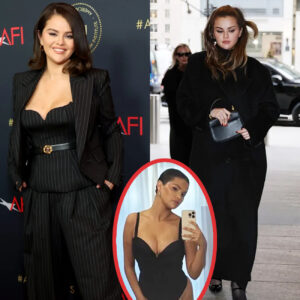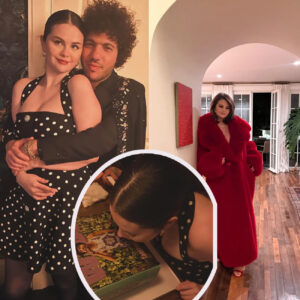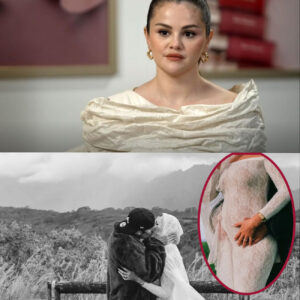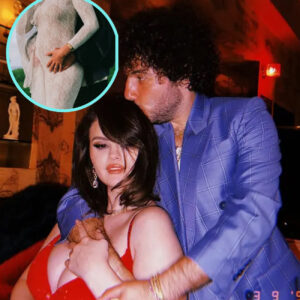
Taylor has just played a sold-out show for 85,000 people in Buenos Aires, the first with Travis in tow as her boyfriend. He has spent the entirety of the three-hour concert singing and dancing in the VIP tent next to Taylor’s dad, who is wearing a Chiefs lanyard around his neck.

And when she changes her lyrics to make them about him — “karma is a guy on the Chiefs, coming straight home to me” — he puts his hands on his cheeks in adorable disbelief.
The clip captures Taylor leaving the stage in one of her signature bedazzled bodysuits, waving goodbye to her fans. The instant she spots Travis, awaiting her with his hands held politely behind his back, she runs to him. He smiles and shakes his head, like he can’t believe his luck. She throws her arms around his neck and kisses him. Their lips remain locked as they spin around slowly. She whispers something in his ear as he continues to hold her close. Confetti falls. Fans shriek. Then they disappear from view.
I’ve never been a diehard Swiftie. I attended the Eras tour, but I wasn’t moved to tears. I don’t parse her lyrics for Easter eggs or eagerly await the release of each Taylor’s Version album. And prior to Travis, I’d never been all that invested in her romantic life — particularly the Joe Alwyn phase. (Hard pass.) And yet, like seemingly every other pop-culture obsessive the world over, that moment in Argentina turned me into a de facto body-language expert, a consumer of countless TikTok videos and “Today Show” segments, a hopeless romantic, a true believer.
Suddenly, I found myself a not-so-neutral observer in the very sort of story I was trained to cover: how a hitmaking blond and a good-natured tight end managed to capture the attention of a divided nation, increasing NFL ratings, boosting Kelce jersey sales and somehow making Taylor even more ubiquitous than she already was.
What was it about that clip of them kissing that made me — made us — feel so damn good?
“What kind of good? That’s important.”
I’m on the phone with Dr. Helen Fisher, a biological anthropologist and senior research fellow at the Kinsey Institute who has spent her career studying brain imaging to understand how love impacts humans.
My Taylor-and-Travis infatuation felt like the gooey, swelling in your throat kind of good. The suspended in some dreamy place where all of life’s promise is fulfilled kind of good. A feeling, Fisher suspects, that comes from oxytocin, a hormone produced by your brain that gives you a sense of calm, of sweetness.
“It’s the basic neural mechanism of attachment,” she says. Others might have seen that moment in Buenos Aires and experienced a dopamine surge — “a feeling of intense pleasure, energy, motivation and optimism” that is often correlated with the rapture of romantic love.
Even if we voyeurs are not kissing Taylor or Travis ourselves, our bodies can still experience the same chemical reactions just from watching them. Even Fisher, who was unfamiliar with Taylor’s career and viewed the clip for the first time after our call, found herself as moved as I was: “It was totally CHARMING — so real, so human, so unrehearsed and so dramatic,” she emailed later. The phenomenon behind it is called “emotional contagion,” according to Fisher — the reason why we tear up when our friends cry or get hungry when those around us are eating.
Taylor Swift is patient zero for emotional contagion.
When she got her start at 17 years old, she presented the image of a teenage girl who longed for a life just out of her grip: On her eponymous debut album, released in 2006, she sang about crying in her room, writing songs about a boy who liked a girl who “got everything that I have to live without.”
Since then, as she’s conjured entire worlds that transport listeners to high school hallways, moss-covered cabins and country road trips, that energy continued to course through her music, creating an identifiable, relatable heroine who carries through her work. The narrator of her songs was a young woman who never felt fully seen by her romantic partners. “Sometimes I feel like everybody is a sexy baby / And I’m a monster on the hill.” She’d always try to save a relationship, but he’d take the easy road out and run. And he never valued her, anyway. “Don’t put me in the basement / When I want the penthouse of your heart.” So fine, leave, she cautioned. But you’ll never be able to forget me. “I left my scarf there at your sister’s house / And you’ve still got it in your drawer even now.”
And then: Travis. This man who seems like the ultimate heteronormative prize. Sickeningly attractive, extremely athletic and, against all odds, not a jerk. He looks like the kind of bro who would date a Victoria’s Secret model at least a decade his junior. The kind of girl Taylor once crooned about being passed over for in high school: “She wears short skirts / I wear T-shirts / She’s cheer captain, and I’m on the bleachers.”
Travis going for the girl on the bleachers felt monumental.
Taylor finding her dream man would be a culmination of everything she’d written about for nearly two decades.
News
Lưu Hương Giang quyết định cho Hồ Hoài Anh cơ hội sau ‘Đạp gió rẽ sóng’. Nữ ca sĩ liền báo có tin vui👇
Lưu Hương Giang quyết định quay về với gia đình sau ‘Đạp gió rẽ sóng’ Ca sĩ Lưu Hương Giang đã không buồn khi phải chia tay…
Selena Gomez reflects on her body’s changes in throwback swimsuit photos: ‘I will never look like this again’
Selena Gomez has opened up about her appearance while candidly reflecting on her body’s changes throughout the years. Taking to her Instagram Story Monday night, the actress/singer showed her…
Selena Gomez takes a bite of boyfriend Benny Blanco’s cake in suggestive photo
Selena Gomez shared a suggestive snap eating a cake depicting boyfriend Benny Blanco.Selena Gomez/Instagram Selena Gomez can’t keep her mouth to herself. The singer took a bite…
Justin Bieber’s mom reacts to rumors Hailey is pregnant with twins
Justin Bieber’s mom had to clarify how many babies her son and daughter-in-law are having after sparking rumors that they could be expecting twins. After the Rhode founder’s…
Selena Gomez explained why she disabled Instagram comments just days before Hailey Bieber’s pregnancy news
No need to “Kill Em with Kindness” — Selena Gomez’s haters can’t even comment on her social media uploads. The actress explained her decision to limit her…
Selena Gomez flaunts Benny Blanco romance after Justin and Hailey Bieber’s pregnancy announcement
Selena Gomez flaunted her relationship with Benny Blanco after Justin and Hailey Bieber revealed they were expecting their first child.Selena Gomez/Instagram Selena Gomez showed off her romance with…
End of content
No more pages to load











